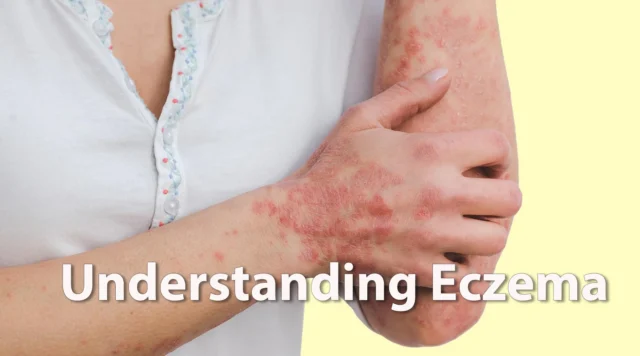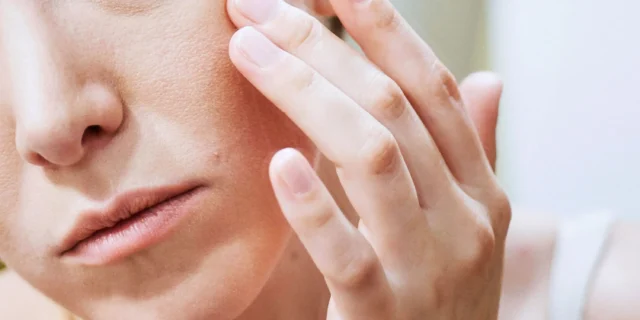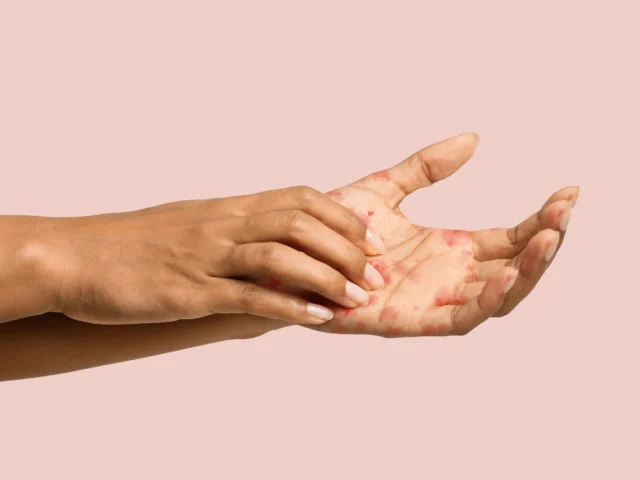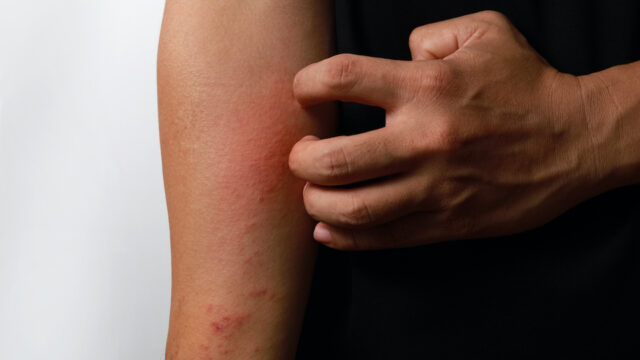Eczema, also known as atopic dermatitis, is a chronic skin condition that affects millions of people worldwide. Eczema flare-ups can be a frustrating and painful experience, and for some, they can happen almost constantly. If you suffer from eczema, it’s important to know that managing flare-ups is possible. In this article, we’ll discuss some tips for dealing with constant eczema flares.
Understanding Eczema

Eczema, also known as atopic dermatitis, is a chronic skin condition that affects millions of people worldwide. Eczema is characterized by dry, itchy, and red skin that can develop into bumps or blisters. In this article, we’ll discuss some key facts about eczema.
Symptoms
Eczema symptoms can vary from person to person, but common symptoms include:
- Dry, scaly skin
- Red, inflamed skin
- Itching and burning
- Cracking and weeping
- Thick, leathery skin
Causes
The exact cause of eczema is not fully understood, but it’s believed to be a combination of genetic and environmental factors. Eczema is more common in people with a family history of the condition, and it’s often associated with other allergic conditions, such as asthma and hay fever.
Triggers
Eczema flare-ups can be triggered by a variety of factors, including:
- Dry skin
- Allergens, such as pollen or pet dander
- Irritants, such as soaps or detergents
- Stress
- Weather changes
- Certain foods
Treatment
There is currently no cure for eczema, but there are many treatments available to help manage symptoms. These include:
- Moisturizers to keep the skin hydrated
- Topical corticosteroids to reduce inflammation and relieve itching
- Immunomodulators to reduce inflammation
- Antibiotics to treat bacterial infections that can occur in areas of broken skin
- Antihistamines to relieve itching
Prevention
There are steps you can take to help prevent eczema flare-ups, including:
- Keeping your skin moisturized
- Avoiding irritants and allergens
- Managing stress
- Identifying and avoiding triggers
- Wearing soft, breathable fabrics
What Causes Eczema Flare-Ups?

Eczema, also known as atopic dermatitis, is a chronic skin condition that causes inflammation and irritation. These are common and can be frustrating and uncomfortable for those who suffer from them. There are many factors that can cause it. In this section, we’ll discuss some of the most common causes.
Dry Skin
One of the most common causes is dry skin. When the skin is dry, it becomes more vulnerable. This is because dry skin is more likely to crack and become irritated, making it easier for irritants and allergens to penetrate the skin.
Allergies
Certain allergens can trigger it. Common allergens that can trigger include pollen, dust mites, pet dander, and certain foods. If you have it, it’s important to identify any allergens that may be triggering it and try to avoid them as much as possible.
Irritants
Chemicals and other irritants can cause it, especially if you have sensitive skin. Common irritants that can trigger include soaps, detergents, perfumes, and certain fabrics.
Stress
Stress is a common trigger. When you are stressed, your body produces hormones that can cause inflammation and exacerbate symptoms. If you suffer from it, it’s important to find ways to manage stress and reduce your risk.
Weather
Changes in temperature and humidity can trigger eczema. Cold, dry weather can be especially harsh on the skin, making it more vulnerable to eczema flare-ups.
Tips for Dealing with Constant Eczema Flares

This is a chronic skin condition that can cause dry, itchy, and irritated skin. It can be a frustrating experience, especially for those who suffer from constant or severe flare-ups. However, there are steps you can take to manage it and reduce the frequency and severity of your flare-ups. In this article, we’ll discuss some tips for dealing with constant eczema flares.
Moisturize Your Skin
One of the most important steps in managing it is to keep your skin moisturized. Choose a moisturizer that is fragrance-free, hypoallergenic, and free of harsh chemicals. Apply the moisturizer to your skin immediately after bathing or showering, when your skin is still damp. This will help to lock in moisture and prevent your skin from becoming dry and irritated.
Avoid Irritants
Many products can irritate your skin, including soaps, detergents, and other personal care products. Choose products that are labeled as “gentle” or “for sensitive skin.” Avoid products that contain fragrances, dyes, or other harsh chemicals that can trigger flare-ups.
Identify and Avoid Triggers
Identifying what triggers your flare-ups can be challenging, but it’s an important step in managing it. Keep a journal to track your symptoms and try to identify any patterns or triggers. This could include certain foods, fabrics, or environmental factors. Once you’ve identified your triggers, try to avoid them as much as possible.
Manage Stress
Stress is a common trigger for flare-ups. Find ways to manage stress, such as practicing relaxation techniques like deep breathing, yoga, or meditation. Exercise is also a great way to relieve stress and improve your overall health.
Use Topical Medications
Topical medications, like some of the best eczema creams, can help to reduce inflammation and relieve itching. However, it’s important to use these medications as directed by your doctor and to avoid overusing them. Overuse of topical medications can lead to skin thinning and other side effects.
Seek Professional Help
If you are experiencing severe or frequent flare-ups, seeking professional help from a dermatologist is highly recommended. A dermatologist can provide a comprehensive evaluation of your condition and offer personalized treatment options based on the severity of your symptoms. They can also help you identify triggers, guide managing them, and monitor your progress over time. Don’t hesitate to seek professional help if you are struggling to manage your symptoms. The sooner you seek treatment, the sooner you can find relief and improve your quality of life.
Conclusion

Dealing with constant eczema flares can be frustrating and challenging, but it’s important to know that there are steps you can take to manage your symptoms. By keeping your skin moisturized, avoiding irritants, identifying and avoiding triggers, managing stress, using topical medications, and seeking professional help, you can take control of your eczema and reduce the frequency and severity of your flares.









